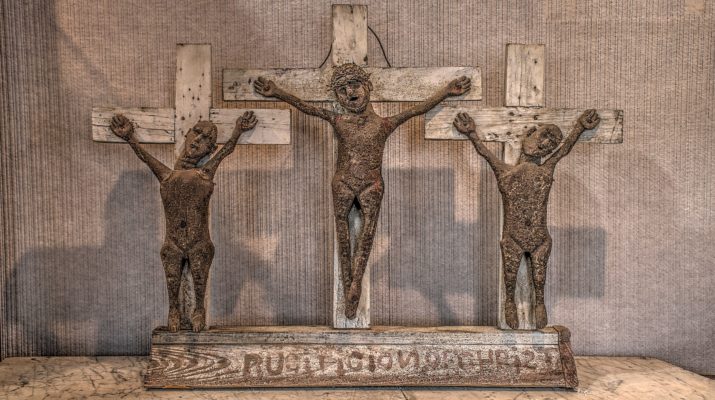Luke 23:33-43
Reign of Christ C
33 When they cameA to the placeB that is calledC The Skull,D they crucifiedE Jesus there
A “came” = erchomai. This is to come or go.
B “place” = topos. This is a place or region. It is a smaller space that can only hold a limited number of people whereas chora is a larger place. Figuratively it could be an opportunity.
C “called” = kaleo. Related to keleuo (to command, order, direct); from kelomai (to urge on). This is to call by name, invite, to name, bid, summon, call aloud.
D “Skull” = kranion. 4x in NT. From kara (the head) OR from the base of keras (horn or something horn-shaped; horn in a literal or figurative sense – that which prevails or a symbol of power). This is skull. It’s where we get the word “cranium” from.
E “crucified” = stauroo. From stauros (upright stake, cross; literally the horizontal beam of a Roman cross, generally carried by the one convicted to die); from the same as histemi (to stand, cause to stand). This can be to attach someone to a cross or fencing with stakes. In a figurative sense, it could be to destroy, mortify, or subdue passions/selfishness.
with the criminals,F oneG on his rightH and one on his left.I
F “criminals” = kakourgos. 4x in NT– 3x of those crucified with Jesus in Luke 23 & 1x of the author of 2 Timothy being chained like a criminal (2:9). From kakos (bad, evil, harm, ill; evil that is part of someone’s core character – intrinsic, rotted, worthless, depraved, causing harm; deep inner malice that comes from a rotten character; can be contrasted with the Greek poneros, which is that which bears pain – a focus on the miseries and pains that come with evil; also contrasting the Greek sapros, which deals with falling away from a previously embodied virtue) + the same as ergon (word, task, action, employment);{from ergo (to work, accomplish) or from erdo (to do)}. This is literally wrongdoer – a criminal, someone who does evil.
G {untranslated} = men. This is truly, indeed, even, in fact. Often, it is not translated, but used to emphasize affirmation.
H “right” = dexios. Perhaps from dechomai (to warmly receive, be ready for what is offered, take, accept, or welcome; to receive in a literal or figurative sense). This is right, right side, or the right hand.
I “left” = aristeros. 4x in NT. From aristos (best). This is better, used figuratively to refer to the left or left hand side.
34 Then JesusJ said, “Father,K forgiveL them, for they do not knowM what they are doing.”N
J “Jesus” = Iesous. From Hebrew Yehoshua (Joshua, the Lord is salvation); {from YHVH (proper name of the God of Israel; the self-existent and eternal one); {from havah (to become) or from hayah (to come to pass, become, be)} + yasha (to deliver, defend, help, preserve, rescue; properly, to be open, wide or free, which implies being safe. So, in a causative sense, this is to free someone)}. This is Jesus or Joshua in Greek – the Lord saves or the Lord is salvation.
K “Father” = pater. This is father in a literal or figurative sense. Could be elder, senior, ancestor, originator, or patriarch.
L “forgive” = aphiemi. From apo (from, away from) + hiemi (to send). This is send away, release, permit, forgive, allow to depart, discharge, or send forth.
M “know” = eido. This is to know, consider perceive, appreciate, behold, or remember. It means seeing with one’s eyes, but also figuratively, it means perceiving – seeing that becomes understanding. So, by implication, this means knowing or being aware.
N “doing” = poieo. This is to make, do, act, construct, abide, or cause.
And they castO lotsP to divideQ his clothing.R
O “cast” = ballo. This is to throw, cast, rush, place, or drop. It is throwing, but it could be with more or less velocity and with more or less force/violence.
P “lots” = kleros. 12x in NT. Perhaps from klero (casting a lot) or from klao (to break in pieces as one breaks bread). This lot, portion, heritage. It is that share assigned to you. It could also refer to a lot used to determine something by fate, chance, or divine will.
Q “divide” = diamerizo. 12x in NT. From dia (through, across to the other side, thoroughly) + merizo (to divide, part, share, distribute, assign; figuratively, to differ); {from meros (part, share, portion figurative or literal); from meiromai (to get your share, receive one’s allotment)}. This is to divide up, distribute, or share. Figuratively, it can mean dissension.
R “clothing” = himation. From heima (garment) OR from ennumi (to put on). This is the outer garment, cloak, robe, or mantle. It is worn loosely over a tunic.
35 And the peopleS stood byT watching,U
S “people” = laos. This is the people or crowd – often used for the chosen people. This is where the word “laity” comes from.
T “stood by” = histemi. Related to “crucified” in v33. See note E above.
U “watching” = theoreo. From theaomai (to behold, look upon, see, contemplate, visit); from thaomai (to gaze at a spectacle; to look at or contemplate as a spectator; to interpret something in efforts to grasp its significance); from theoros (a spectator or envoy). This is gazing, beholding, experiencing, discerning. It is looking at something to analyze it and concentrate on what it means. This is the root of the word “theatre” in that people concentrate on the action of the play to understand its meaning.
but the leadersV scoffedW at him, saying,X
V “leaders” = archon. From archo (to rule, begin, have first rank or have political power). This is ruler, leader, magistrate, official, prince, chief.
W “scoffed” = ekmukterizo. 2x in NT. From ek (from, from out of) + mukterizo (to sneer at, mock, ridicule, reject; to turn one’s nose at someone or to make mouths); {from mukter (nostril) OR from mukaomai (to roar or bellow); {from muzo (to moo)}}. This is to deride, ridicule, sneer, reject. It is to snort in contempt.
X “saying” = lego. This is to speak, say, name, call, command. It is generally to convey verbally.
“He savedY others;Z let him save himself if he is the MessiahAA of God,BB his chosenCC one!”
Y “saved” = sozo. From sos (safe, rescued, well). This is to save, heal, preserve, or rescue. Properly, this is taking someone from danger to safety. It can be delivering or protecting literally or figuratively. This is the root that “savior” and “salvation” come from in Greek.
Z “others” = allos. This is other, another. Specifically, it is another of a similar kind or type. There is a different word in Greek that speaks of another as a different kind (heteros).
AA “Messiah” = Christos. From chrio (consecrate by anointing with oil; often done for prophets, priests, or kings). Literally, the anointed one, Christ. The Greek word for Messiah.
BB “God” = Theos. From Proto-Indo-European origins, meaning do, put, place. This is God or a god in general.
CC “chosen” = eklektos. Related to “saying” in v35. From eklego (to choose, select, elect); {from ek (from, from out of) + lego (see note X above)}. This is to select or choose. It is making a personal choice – a favorite.
36 The soldiersDD also mockedEE him, coming upFF and offeringGG him sour wineHH
DD “soldiers” = stratiotes. From stratia (army; used figuratively for large organized groups like the angels and the hosts of heaven, which is to say the stars); from the same as strateuo (to wage war, fight, serve as a soldier; used figuratively for spiritual warfare); or from the base of stronnuo (to spread, to spread out like a bed). This is a soldier in a literal or figurative sense.
EE “mocked” = empaizo. 13x in NT. From en (in, on, at, by, with, among) + paizo (to play like a child does – can include singing and dancing); {from pais (child, youth, servant, slave); perhaps from paio (to strike or sting)}. This is to mock, ridicule, jeer.
FF “coming up” = proserchomai. Related to “came” in v33. From pros (for, at, towards) + erchomai (see note A above). This is to approach, draw near, come up to. It is also used figuratively to mean worship.
GG “offering” = prosphero. From pros (at, to, with, towards, advantageous for) + phero (to bear, bring, lead, make known publicly; to carry in a literal or figurative sense). This is to offer gifts or sacrifices, to bring up.
HH “sour wine” = oxos. 6x in NT – all of the crucifixion. From oxus (sharp, eager, quick); probably related to akmen (even now, still, yet); from the same as akmazo (become ripe, reach maturity); from akme (point or edge); related to ake (point). This is sour wine or vinegar. As the lowest grade of Roman wine, it was a common drink for Roman soldiers.
37 and saying, “If you are the KingII of the Jews,JJ save yourself!”
38 There was also an inscriptionKK over him, “This is the King of the Jews.”LL
II “King” = basileus. Probably from basis (step, hence foot; a pace); from baino (to walk, to go). This is king, emperor, or sovereign.
JJ “Jews” = Ioudaios. From Ioudas (Judah, Judas); from Hebrew Yehudah (Judah, son of Jacob, his tribal descendants, a name for the southern kingdom. Literally, it means praised); probably from yadah (to throw one’s hands into the air in a gesture of praise); from yad (hand). This is Jewish, a Jew, or Judea.
KK “inscription” = epigraphe. 5x in NT. From epigrapho (to write on, inscribe, read; a literal inscription or a mental one); {from epi (on, upon, to, against, what is fitting) + grapho (to write, describe)}. This is some kind of title or label like an inscription or superscription.
LL Some manuscripts add “written in Greek and Latin and Hebrew.” “Written” = gamma. Related to “inscription” in v38. 15x in NT. From grapho (see note KK above). This is something drawn or written. So, it could be a letter of the alphabet, an epistle, a book, literature, etc. “Greek” = Hellenikos. 2x in NT. From Hellen (Greek; used for Gentiles, broader populations that spoke Greek and were a part of Greek culture regardless of their heritage); {from Hellas (Hellas, what Greeks called themselves); perhaps from helane (torch) OR from selene (moon)}. This is Hellenic, the Greek language. See https://en.wikipedia.org/wiki/Helen_(given_name). “Latin” = Rhomaikos. 1x in NT. From Rhomaisti (Roman, of Rome); from Rhome (Rome); from the base of rhonnumi (to strengthen, be firm, have health; used as a salutation in letters at the end); {probably from rhoomai (to move quickly)} OR from Latin Romulus (the one who founded Rome according to legend – many scholars believe this was suggested after the fact i.e. long after Rome was called Rome) OR from Rumon or Rumen (the Tiber river); {related to Proto-Indo-European root *srew- (to flow)} OR from Etruscan ruma (teat). This is Roman i.e. the Roman language Latin. See https://en.wiktionary.org/wiki/Roma#Latin.. “Hebrew” = Hebraikos. 1x in NT. From Eber (Heber, one of Christ’s ancestors); from Hebrew Eber (the region beyond; Eber, the name of several Israelites including a descendant of Shem); from abar (to pass over, pass through, or pass by; cross over or to alienate; used for transitions). This is Hebraic i.e. the language of the Hebrews.
39 OneMM of the criminals who were hangedNN there kept deridingOO him and saying, “Are you not the Messiah? Save yourself and us!”
MM “one” = heis. This is one, a person, only, some.
NN “hanged” = kremannumi. 7x in NT. This is to hang or suspend. Figuratively, it means to depend.
OO “deriding” = blasphemeo. From blasphemos (blasphemer, reviler, reviling; speaking slander or evil); {from perhaps blapto (to harm or to hinder) + pheme (saying, news, rumor, fame) {from phemi (to say, declare, speak comparatively through contrasts, bring to light); from phao (to shine)}}. This is to slander, malign, hurl abuse, speak against, blaspheme, or defame. It is speaking evil or abusive language – not acknowledging what is good or worth reverence/respect.
40 But the otherPP rebukedQQ him, saying,RR “Do you not fearSS God, since you are under the same sentence of condemnation?TT
PP “other” = heteros. This is other, another, different, strange. It is another of a different kind in contrast to the Greek word allos, which is another of the same kind. This could be a different quality, type, or group.
QQ “rebuked” = epitimao. From epi (on, upon, against, what is fitting) + timao (properly, this is setting a value or price on something, to estimate. Figuratively, it speaks to what level of honor we afford someone or something depending on our personal feeling toward it. By implication, this can mean to revere or honor); {from time (worth or perceived value; literally, price, but figuratively, the honor or value one sees in someone or something; can be esteem or dignity; can also mean precious or valuables); from tino (to pay, be punished, pay a penalty or fine because of a crime); from tio (to pay respect, value)}. This is to render what is due – to assign the value that is appropriate for the situation. So, it could mean to honor or to warn, to rebuke or to charge. Generally, it is a warning meant to guide someone away from doing something wrong or taking the wrong path. It can imply to forbid.
RR “saying” = phemi. Related to “deriding” in v39. See note OO above.
SS “fear” = phobeo. From phobos (panic flight, fear, fear being caused, terror, alarm, that which causes fear, reverence, respect); from phebomai (to flee, withdraw, be put to flight). This is also to put to flight, terrify, frighten, dread, reverence, to withdraw or avoid. It is sometimes used in a positive sense to mean the fear of the Lord, echoing Old Testament language. More commonly, it is fear of following God’s path. This is where the word phobia comes from.
TT “sentence of condemnation” = krima. From krino (to judge, decide, think good, condemn, determine, pass judgment, stand trial, sue; judging whether in court or in a private setting; properly, mentally separating or distinguishing an issue – to come to a choice or decision, to judge positively or negatively in seeking what is right or wrong, who is innocent or guilty; can imply trying, condemning, punishing, or avenging). This is judgment, sentence, verdict. Sometimes, this can have a negative sense – condemnation. It is the decision and the full force of its effect negative and positive.
41 And we indeedUU have been condemned justly,VV for we are gettingWW
UU “indeed” = men. Same as {untranslated} in v33. See note G above.
VV “justly” = dikaios. 5x in NT. From dikaios (correct, righteous, just, or a righteous person; implies innocent or conforming to God’s standard of justice); from dike (the principle of justice; that which is right in a way that is very clear; a decision or the execution of that decision; originally, this word was for custom or usage; evolved to include the process of law, judicial hearing, execution of sentence, penalty, and even vengeance; more commonly, it refers to what is right); may be from deiknumi (to show, point out, exhibit; figurative for teach, demonstrate, make known). This is righteously, uprightly, or equitably. It can also refer to something being as it ought.
WW “getting” = apolambano. 10x in NT. From apo (from, away from) + lambano (active acceptance/taking of what is available or what has been offered; emphasizes the choice and action of the individual). This is to receive back, separate, to get one’s due.
what we deserveXX for our deeds,YY but this man has doneZZ nothing wrong.”AAA
XX “deserve” = axios. From ago (to lead, bring, carry, guide, drive, go). This is related to weight or worth – deserving, suitable, corresponding, due reward.
YY “deeds” = prasso. This is to do or practice – something done on an on-going basis or by habit. It can also mean to accomplish, attend, or commit.
ZZ “done” = prasso. Same as “deeds” in v41. See note YY above.
AAA “wrong” = atopos. Related to “place” in v33. 4x in NT. From a (not, without) + topos (see note B above). This is literally out of place. It can be unusual, improper, or amiss. It can also be wrong in a moral sense, improper, harmful, unreasonable.
42 Then he said, “Jesus, rememberBBB me when you come in your kingdom.”CCC
43 He replied, “TrulyDDD I tell you, todayEEE you will be with me in paradise.”FFF
BBB “remember” = mimnesko. From mnaomai (to remember; by implication give reward or consequence); perhaps from meno (to stay, abide, wait, endure). This is to remind or remember. It is memory through an active, intentional process or being mindful of. It is not incidentally or accidentally remembering.
CCC “kingdom” = basileia. Related to “king” in v37. From basileus (see note II above). This is kingdom, rule, authority, sovereignty, royalty, a realm.
DDD “truly” = amen. From Hebrew amen (verily, truly, amen, truth, so be it, faithfulness); from aman (to believe, endure, fulfill, confirm, support, be faithful, put one’s trust in, be steadfast. Figuratively, this is to be firm, steadfast, or faithful, trusting, believing, being permanent, morally solid). This word is literally firmness, but figuratively fidelity, faithfulness, honesty, responsibility, trust, truth, steadfastness. Properly, it is to be sure, certain, or firm. This is a word of emphasis indicating that something crucial follows.
EEE “today” = semeron. From hemera (day, time, daybreak); perhaps from hemai (to sit). This is today, now, at present.
FFF “paradise” = paradeisos. 3x in NT. From “Persian pardeda– (enclosure, garden, park); from Old Iranian paradaioa and pardesa (estate); from Proto-Iranian paridayjah (enclosure).” This is a garden or paradise. It could be park grounds for leisure or hunting, a grove, or specifically Eden. It is the same root that “paradise” comes from. See https://en.wiktionary.org/wiki/%CF%80%CE%B1%CF%81%CE%AC%CE%B4%CE%B5%CE%B9%CF%83%CE%BF%CF%82#Ancient_Greek
Image credit: “Crucifixion of Christ” by “Unknown black artist; possibly mid to late 19th century or early 20th century.” Photo by Dsdugan, 2019.




